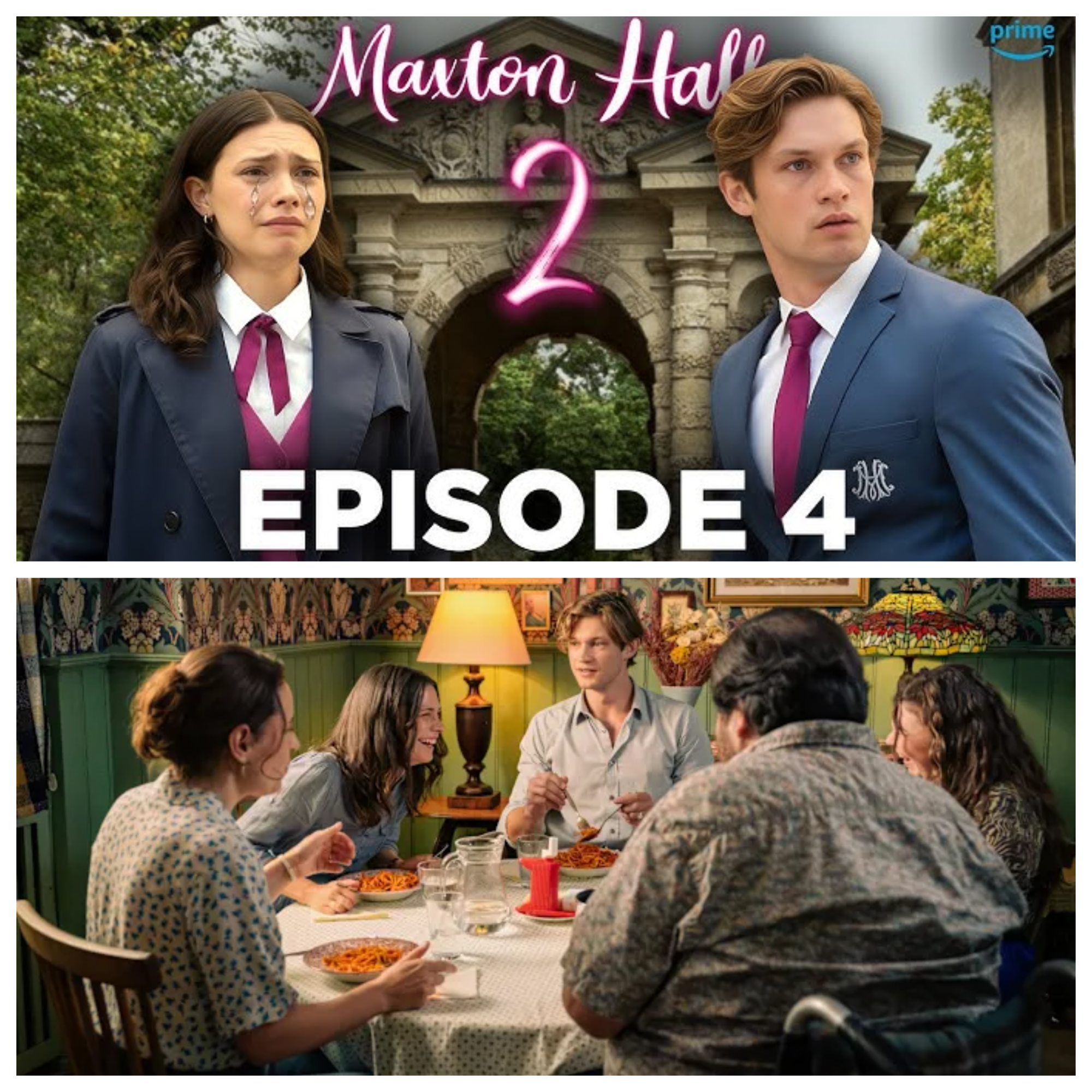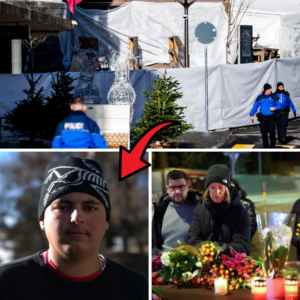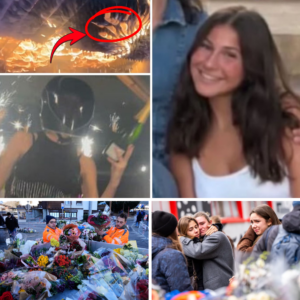
The clock strikes midnight in the opulent halls of Maxton Hall, but on November 14, 2025, Prime Video’s servers might as well have been ground zero for an emotional apocalypse. Episode 4 of Maxton Hall – The World Between Us Season 2 dropped at precisely 12:01 a.m. GMT, and within minutes, #MaxtonHallS2E4 was clawing its way to the top of global trends. Why? Because showrunners Martin Schreier and Tarek Roehlinger didn’t ease viewers back into the intoxicating mix of forbidden romance, class warfare, and gothic teen intrigue. No, they hurled us straight into a vortex of heartbreak with an opening sequence so raw, so viscerally tragic, it feels like a dagger to the chest. A flashback to a “beautiful memory” – tender, luminous, achingly intimate – is savagely interrupted by a devastating car crash that doesn’t just flip a vehicle… it upends everything fans thought they knew about James Beaufort’s fragile redemption arc.
Picture this: the screen fades in soft-focus, bathed in the golden haze of a late-summer afternoon. It’s not the elite boarding school’s ivy-clad quads or the Beaufort family’s sprawling estate we’re seeing. It’s a hidden meadow on the outskirts of Oxford, the same sun-kissed spot where, in a stolen moment from Episode 1’s fever-dream prologue, James (Damian Hardung, all brooding intensity and barely contained storm clouds) and Ruby (Harriet Herbig-Matten, fierce and luminous as ever) first surrendered to the gravity of their enemies-to-lovers pull. The camera lingers on their younger selves – perhaps a year prior, pre-trauma, pre-betrayal – sprawled on a checkered blanket amid wildflowers. James, unscarred by grief, traces lazy patterns on Ruby’s palm with a blade of grass, his voice a low rumble: “In another life, I’d build you a world without walls.” Ruby laughs – that rare, unguarded melody that slices through her defenses – and leans in, their foreheads touching as fireflies begin to wink in the twilight. It’s pure, unadulterated joy: the kind of memory that screams “happily ever after” in a show built on “what ifs.” Violins swell, courtesy of composer Nils Oswald’s haunting score, and for 90 blissful seconds, we – the audience – exhale. We’ve earned this. After Season 1’s blistering finale, where Ruby’s scholarship dreams clashed with James’s toxic legacy, and the Season 2 premiere’s gut-punch of Cordelia Beaufort’s off-screen death, this feels like mercy.
Then – screech. The music fractures like safety glass. Headlights pierce the reverie, harsh and unrelenting, as the frame shudders into present-day chaos. We’re no longer in the meadow; we’re strapped into the passenger seat of James’s sleek black Audi, hurtling down a rain-slicked English motorway at 90 mph. The dashboard clock reads 2:17 a.m. – the witching hour for bad decisions. James’s knuckles whiten on the wheel, his face a mask of fractured fury, eyes red-rimmed from the gala’s emotional wreckage (that Episode 3 speech where he bared his soul to a room full of skeptics? Iconic, but costly). The radio crackles with a muffled pop ballad – ironic, some early ’00s hit about lost love – but James slams it off, muttering, “Not tonight.” His phone buzzes on the mount: Ruby’s name flashes, unanswered. A voicemail notification pings from his father, Mortimer (Fedja van Huët, oozing aristocratic venom): “Come home, boy. The Beauforts don’t beg.” But James isn’t listening. He’s unraveling – grief for his mother a fresh wound, guilt over pushing Ruby away festering like an untreated cut. The Audi fishtails on a puddle, hydroplaning into the oncoming lane. Horns blare. Tires scream. And then – impact.
The crash unfolds in excruciating slow-motion horror, a masterclass in visceral filmmaking that rivals the Red Wedding’s brutality. Metal twists with a metallic wail; glass explodes in crystalline shards that catch the sodium glow of streetlamps like deadly confetti. The car spins, flips – once, twice – crumpling against a guardrail in a symphony of destruction. Silence descends, broken only by the hiss of steam from the radiator and the distant wail of sirens. The camera – handheld, intimate – creeps toward the wreckage. James hangs upside down, blood trickling from a gash on his forehead, his breaths ragged gasps. His hand, trembling, fumbles for his phone amid the debris. The screen illuminates his face: he dials Ruby. One ring. Two. Voicemail. “Ruby,” he rasps, voice breaking like the chassis around him, “I… I can’t do this without you. Please. I’m sorry. For everything.” Click. The line goes dead – or does it? Cut to black. End of cold open.
Viewers didn’t just gasp; they shattered. Social media ignited like a powder keg: “MAxton Hall Episode 4 just killed me in the first 3 minutes WHAT WAS THAT,” tweeted @RubyJamesForever, her post amassing 150K likes in an hour. TikTok flooded with reaction vids – fans pausing mid-sob, ugly-crying over fan-edits syncing the crash to Hozier’s “Take Me to Church.” “This isn’t YA drama anymore; it’s trauma porn,” lamented one Reddit thread on r/MaxtonHall, with 5K upvotes debating if the show’s veering too dark. But here’s the genius twist: that “beautiful memory” wasn’t mere nostalgia. It’s a deliberate gut-punch, echoing the books’ themes from Mona Kasten’s Save You (the Season 2 source material), where James’s post-crash epiphany forces him to confront not just his demons, but the empire built on them. Hardung’s performance? Oscar-reel worthy – his eyes, wild with terror, convey a boy who’s finally hit rock bottom, realizing the Beaufort fortune can’t buy back the girl he loves.
The episode doesn’t let up from there. Picking up threads from the mid-season drop (Episodes 1-3 premiered November 7, racking up 12 million global views in 72 hours), we dive into the fallout. Ruby, back at Maxton Hall orchestrating the Campbell Gala’s chaotic aftermath, fields a frantic call from an unknown number: it’s the paramedics. “James Beaufort? Critical condition. St. Mary’s ER.” Her world tilts – the same shock that hit her when she learned of Cordelia’s overdose-fueled demise in Episode 1. Cut to Ruby racing through rain-lashed streets, Harriet Herbig-Matten channeling raw panic with a single, tear-streaked glance in the cab’s rearview. At the hospital, she collides with the Beaufort machine: Mortimer, stone-faced in a bespoke suit, barking orders at surgeons; sister Lydia (Sonja Weißer), pregnant and unraveling, clutching a rosary like a lifeline. “You did this,” Lydia hisses at Ruby, venom laced with grief. “He was fine until you broke him.”
Flashbacks intercut the vigil: not just the meadow idyll, but fractured glimpses of the crash’s prelude. Episode 3’s gala triumph – James’s raw confession, “I pushed away the woman I love because I thought love was a luxury I couldn’t afford” – curdles into isolation. Post-speech, Mortimer drags him into a side room, hissing, “Vulnerability is for the weak. Marry Elaine Ellington, secure the merger, or watch your legacy burn.” James bolts, the weight of paternal poison propelling him into the night. The drive becomes a metaphor: headlights cutting through fog like his blurred vision of the future, every swerve a dodged truth about his privilege, his pain, his profound need for Ruby – the scholarship girl who sees through his armor.
By the 20-minute mark, James stabilizes – a collapsed lung, fractured ribs, but alive. Ruby sneaks into his room as dawn breaks, the beeps of monitors underscoring their reunion. “You idiot,” she whispers, fingers brushing his bruised knuckles. “Calling me after you try to audition for a Fast & Furious sequel?” He stirs, eyes fluttering open – that signature Hardung smolder, dimmed but defiant. “Had to make sure you’d come running.” It’s their banter, sharp as ever, but laced with something new: maturity. James, bandaged and broken, admits he’s starting therapy – a plot pivot from the books, where his crash catalyzes change but skips the couch sessions. “Mum’s gone. Dad’s a ghost. You’re the only real thing left.” Ruby, torn between fury and forgiveness, lays it bare: “Love me? Prove it. Walk away from the empire that’s killing you.”
The episode’s B-stories weave a richer tapestry of turmoil. Lydia’s secret pregnancy – revealed in a hushed confrontation with Deputy Principal Sutton (a promoted antagonist from Season 1) – spirals into panic; she’s carrying his child, a ticking bomb for the Beaufort name. Meanwhile, Ruby’s crew – Ember (Runa Greiner), the fiery twin who’s secretly funding her own escape; Kieran (Frederic Balonier), nursing a crush on Lin Wang (Andrea Guo) amid Oxford application stress – rallies for a midnight picnic in the quad, blending levity with loyalty. But shadows loom: Elaine Ellington (Eli Riccardi), the scheming socialite, slithers back with merger whispers, texting Lydia, “Keep an eye on our wayward prince. Ruby’s just a phase.”
Climax builds to a clandestine London getaway – James, discharged against doctor’s orders, whisks Ruby to a fog-shrouded flat overlooking the Thames. No grand gestures, just takeout curry and truths unpacked like forgotten luggage. “The crash? It wasn’t the road,” he confesses. “It was me – crashing into who I’m supposed to be.” Their reconciliation simmers: a tentative kiss interrupted by James’s phone – Mortimer, demanding his return for a “family summit.” Cliffhanger: Ruby, spotting a tabloid alert on James’s screen (“Beaufort Heir’s Mystery Crash: Drugs or Despair?”), freezes. Is this the spark that reignites their fire… or the fuse to their final fracture?
Maxton Hall Season 2, adapting Save You with bold deviations, isn’t just teen soap; it’s a scalpel to the soul, dissecting privilege’s poison and love’s precarious power. Episode 4, streaming now on Prime Video, clocks in at 48 minutes of magnificence – but that opener? It’ll haunt you longer than a Maxton ghost. As one fan posted, “James’s crash didn’t just wreck the car. It wrecked me.” With two episodes left in the drop (November 21 and 28), one question burns: Can Ruby save James from himself? Or will the world between them widen into an uncrossable chasm?





